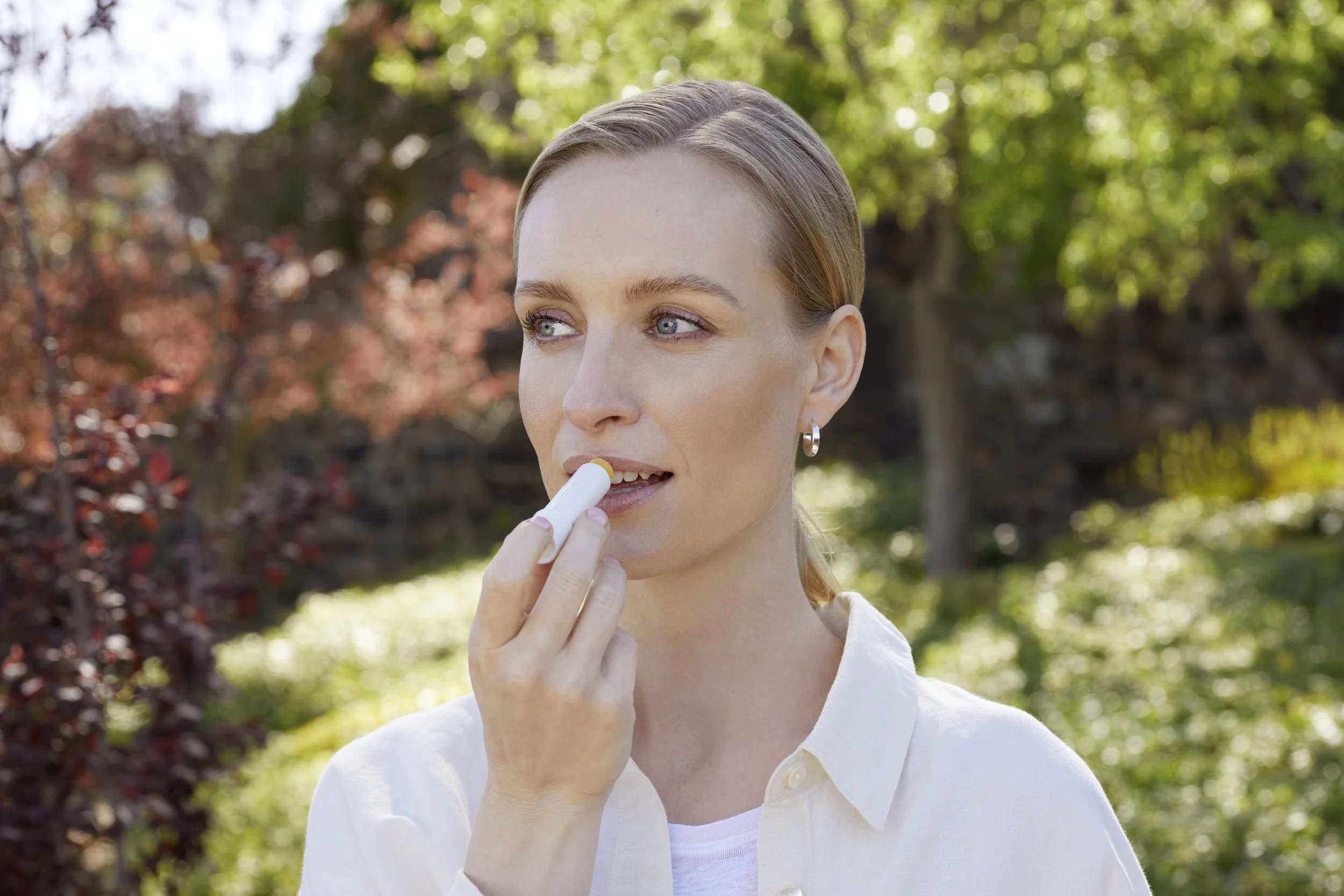Hyaluronic Acid, Coenzyme Q10 & Ceramides
Beautiful skin and personal well-being are important to all of us, no matter our age. It is well documented that good skincare with effective anti-ageing ingredients can prevent the first signs of skin ageing. At lavera Natural Beauty, we rely on the power of natural ingredients for anti-ageing, which care for your skin and protect it as much as possible from natural ageing. In this article, we put the active ingredients Coenzyme Q10, Hyaluronic Acid and Ceramides in the spotlight, and explain their specific benefits for your skin.
Power ingredients in lavera Natural Beauty
What is Hyaluronic Acid?
Hyaluronic acid is a naturally occurring substance found in every living organism. The human body contains around 15 grams of hyaluronic acid, with 5 grams of it located in our skin. However, from the age of 25, the body’s natural level of hyaluronic acid begins to drop. This age-related reduction in hyaluronic acid leads to a loss of skin elasticity and the formation of wrinkles.
Hyaluronic acid plays a key role in moisture retention, as 1 gram of hyaluronic acid can hold 6 litres of water, contributing to the hydration (the binding of water molecules) and elasticity of the skin. Additionally, hyaluronic acid stimulates the production of elastic and collagen fibers in our skin. Hyaluronic acid has a clear and gel-like consistency.
What does the skin need and at what age?
Effects of hyaluronic acid on the skin
Hyaluronic Acid: Size Matters
Hyaluronic acid comes in various sizes, consisting of chains of different lengths of disaccharides. These chains can range from 250 to 50,000 disaccharide units. The weight, measured in kilodaltons (kDA), varies accordingly. The length of the chains influences the properties of hyaluronic acid. The smaller the hyaluronic acid chains, the deeper they can penetrate the skin. In the INCI (International Nomenclature of Cosmetic Ingredients), they are referred to as Sodium Hyaluronate, regardless of their size.
Some products in the lavera range contain up to three different types of hyaluronic acid of varying sizws: for example, our Hydro Refresh Cream Gel and our Firming Face Care range. These different sizes (low, medium and high molecular weight) allow the various layers of the skin to be moisturised.
What do creams with Hyaluronic Acid do?
If you are wondering, “What is hyaluronic acid good for?” you are in the right place. Imagine this: 1 gram of hyaluronic acid can hold up to 6 litres of water! Because hyaluronic acid can bind such large amounts of water and store it in our connective tissue, it helps to give the skin a plump and smooth appearance. Hyaluronic acid also strengthens the skin barrier. It improves skin elasticity and reduces the appearance of fine lines and wrinkles
In cosmetics, hyaluronic acid is primarily used in facial creams and other skincare products to treat wrinkles. Hyaluronic acid is particularly effective for fine and superficial wrinkles, such as crow’s feet. When applied to the skin, a cream with hyaluronic acid can reduce the depth and number of wrinkles and improve skin elasticity.
Additionally, a cream with hyaluronic acid can significantly enhance the skin’s moisture levels. It is also noteworthy that hyaluronic acid is considered very well-tolerated, making it suitable for all skin types.
Hyaluronic Acid in lavera products
Due to its excellent hygroscopic properties (i.e., attracting and binding water), hyaluronic acid is already used in many cosmetic formulations. At lavera Natural Beauty, we utilise natural 3-fold hyaluronic acid in products such as our Firming Facial Care range and the Hydro Refresh Cream Gel. “3-fold” means that these products contain hyaluronic acid variants of three different sizes, which can moisturise both the uppermost and middle layers of the skin.
Together with Bakuchiol, the gentler and plant-based alternative to retinol, this special formulation ensures a firmer, fresher, and more even skin appearance.
Q10: The energy booster for your skin
Coenzyme Q10 naturally occurs in the skin, particulary in the dermis and epidermis. These layers benefit from the antioxidant properties of Q10 , which protect the skin from oxidative stress and damage caused by free radicals. Due to their location, our body’s Q10 molecules are constantly exposed to external influences such as UV radiation.
What is Coenzyme Q10 and how does it work?
Coenzyme Q10 (also known as CoQ10 or Ubiquinone) is a fat soluble molecule found in all living cells that play a role in energy production within the mitochondria. Mitochondria are small “powerhouses” located in every cell that supply energy to them. As an antioxidant, Coenzyme Q10 protects against free radicals, which are aggressive oxygen compounds that can accelerate skin ageing. Free radicals are aggressive molecules or atoms with an unpaired electron, making them very reactive. An antioxidant binds these free radicals and neutralises them.
Our body produces most of its Q10 needs on its own. However, under stress, UV radiation, or with age, the natural concentration of Q10 decreases. A declining Q10 level leads to signs of skin ageing, such as the formation of wrinkles. The good news is that cosmetics containing Q10 as an ingredient can replenish our cellular Q10 levels in the skin.
-
Studies show that the active ingredient Q10 in cosmetics can be directly absorbed through the outermost layer of the skin. Q10 helps to improve the efficiency of cellular processes by increasing cellular energy and protects the skin from free radicals, which can lead to premature skin ageing. Due to it’s antioxidant properties, it supports the repair of skin damage, such as signs of ageing. When applied to the skin, it helps reduce the appearance of wrinkles, improves skin texture, and enhances elasticity. Additionally, Q10 can stimulate collagen production in the skin. A low collagen level is also associated with the formation of wrinkles.
-
The body produces most of its Q10 needs on its own. However, under the influence of external stress factors such as UV radiation and with increasing age, the Q10 content in our skin decreases- specifically between the ages of 20 and 66. This also reduces the function of our mitochondria, slowing down the cellular metabolism , which causes our skin to age. A routine with cosmetic products containing Q10 can help compensate for these losses or replenish the skin’s Q10 stores, thereby slowing down the ageing process.
People with stressed skin can benefit with a cream with Q10 as the ingredient neutralises free radicals and increases the skin’s antioxidant capacity.
For mature skin, which has a lower level of natural Q10 due to advanced age, Q10 in cosmetics can help make up for this deficit. This can reduce the appearance and depth of wrinkles and improve skin texture and elasticity.
-
Skincare products with the same active ingredient Coenzyme Q10 can replenish the Coenzyme Q10 levels in the skin. Creams with Q10 are particularly well-suited to revitalise the skin, promote cell regeneration, and reduce the appearance and depth of wrinkles. Thus, a facial care routine with Q10 can help reduce the signs of skin ageing. Additionally, due to its antioxidant properties, Q10 can reduce free radicals, which are known to damage skin cells.
Q10 in lavera products
Our vegan basis sensitiv care series with Q10 utilises the antioxidant and energising properties of Q10 to protect and revitalise the skin. This well-tolerated series is ideal for daily care. Thanks to its unique active ingredient composition with natural coenzyme Q10, which is obtained through natural fermentation from corn starch, it has been proven to reduce wrinkles- and all in 100% certified natural cosmetics quality, without mineral oils and without artificial fragrances, colours and preservatives (according to EU cosmetics regulation).
The best anti-ageing ingredients for you
Our star ingredients coenzyme Q10, bakuchiol, hyaluronic acid and phytoceramides naturally counteract the ageing process. Here we tell you which anti-ageing ingredients we use in our skin care products and the reason for choosing them.
Coenzyme Q10
The ultimate natural anti-ageing assistant! The body makes its own Coenzyme Q10 and it plays an important role in cell supply. It is found in the lipid bilayer of the cell membrane.
lavera’s special Q10 active ingredient complex contains certified organic olive oil, actives derived from the unsaponifiable fraction of olive oil, Abyssinian oil, phytosterols and lecithin. It can prevent wrinkles and helps the skin regenerate itself.
Natural hyaluronic acid
Your moisture boost! Hyaluronic acid occurs naturally in the body. As a natural component of connective tissue, it supports the collagen and elastin fibres in the skin.
The natural triple hyaluronic acid used in some lavera products comes in three different molecular weights that each penetrate the skin in a different way, helping it to absorb and retain extra moisture
How is hyaluronic acid actually produced?
It’s produced through a biotechnological process known as bacterial fermentation in which a strain of bacteria is cultures in a nutrient medium. This medium contains all the nutrients the bacteria need to grow and produce hyaluronic acid. The bacteria grow and multiply, producing hyaluronic acid as a by-product of their metabolism. The resulting hyaluronic acid is then harvested, purified, concentrated and dried.
Bakuchiol
The natural alternative to retinol! Bakuchiol is extracted from the seeds of the Indian babchi plant. In natural cosmetics, it is used as a natural and gentle alternative to retinol. Bakuchiol helps to counteract the skin ageing process the natural way.
This well-tolerated powerhouse ingredient supports the skin through the natural ageing process and leaves it feeling silky smooth.
Are bakuchiol and retinol similar?
Both ingredients effectively combat the signs of ageing and achieve similar results.
Bakuchiol is proven to stimulate the skin’s own collagen production, significantly reduces the depth of wrinkles and improves the complexion in terms of skin tone, elasticity and radiance. Like retinol, this natural ingredient can have positive effects on skin firmness, elasticity and signs of photoageing. Bakuchiol thus shares the benefits of retinol, but is much better tolerated, which makes it suitable for sensitive and dry skin.
Our Basis Sensitiv Q10 range is the perfect introduction to anti-ageing products and is recommended from the age of 25. Formulated with natural coenzyme Q10, this skin care range verifiably reduces wrinkles and delivers intense moisture. Age recommendation: 25+ years.
The Firming range with triple hyaluronic acid and highly effective bakuchiol, the natural alternative to retinol, is recommended for ages 35 and up. This product range is designed to firm and tighten the skin. Age recommendation: 35-55 years.
What lavera anti-ageing products can do for your skin
Click here for more tips
Lip Care
Glow In Cosmetics
















